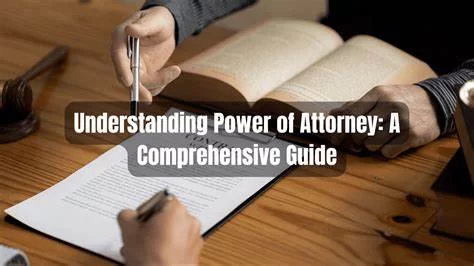
- 1-understanding-the-power-of-attorney
- 2-types-of-power-of-attorney-and-their-uses
- 3-common-situations-where-power-of-attorney-is-essential
- 4-how-to-select-the-right-agent-for-your-poa
- 5-legal-implications-and-limitations-of-poa
- 6-real-life-case-studies-illustrating-poa-usage
- 7-getting-professional-help-with-power-of-attorney-documents
1. Understanding the Power of Attorney
A Power of Attorney (POA) is a legal document that grants one person the authority to act on behalf of another in specified matters. This tool is essential in situations where the principal—the person granting the power—may be unable or unavailable to manage their affairs. The scope and duration of a POA depend on the type of power granted and the principal’s wishes.
Essentially, a Power of Attorney is used to delegate decision-making powers, whether for financial transactions, healthcare decisions, or legal matters. It offers flexibility and security, allowing trusted agents to handle complex tasks efficiently, ensuring the principal’s interests are protected even when they cannot be physically present or mentally capable.
1.1 Importance of Clarity in POA Documents
Clarity in outlining the powers granted is crucial. A well-drafted POA clearly states the extent of authority, limits, and conditions under which the agent can act. This precision prevents misuse and legal disputes, safeguarding both parties.
2. Types of Power of Attorney and Their Uses
There are several types of Power of Attorney, each serving different purposes. A General POA grants broad powers over financial and legal affairs, often used temporarily during travel or incapacitation. A Durable POA remains effective even if the principal becomes incapacitated, making it vital for long-term planning.
Healthcare POA specifically allows an agent to make medical decisions. Limited or Special POA restricts authority to particular tasks, such as selling property or managing a bank account. Understanding these types helps individuals choose the right POA to meet their needs effectively.
3. Common Situations Where Power of Attorney Is Essential
POAs are widely used in scenarios such as aging or ill individuals who need someone to manage their finances or healthcare. They are also critical for business owners who want to delegate operational control during absences. Furthermore, during travel, military deployment, or unexpected emergencies, POA ensures continuity in managing personal and financial matters.
For example, an elderly parent may grant their adult child a Durable POA to handle bill payments and medical decisions, preventing complications if sudden health issues arise. Similarly, an individual undergoing surgery may appoint a trusted friend with a Limited POA to manage their affairs during recovery.
4. How to Select the Right Agent for Your POA
Choosing the appropriate agent is one of the most critical steps in creating a Power of Attorney. The agent must be trustworthy, responsible, and capable of making decisions aligned with the principal’s best interests. Many select close family members, while others prefer professional fiduciaries or attorneys.
It’s important to discuss expectations openly and provide detailed instructions within the POA document. Periodic review and communication ensure the agent understands their role and responsibilities clearly, reducing the risk of abuse or mismanagement.
5. Legal Implications and Limitations of POA
While a POA is a powerful legal instrument, it comes with limitations. The authority granted ends upon the principal’s death or revocation. Agents must act within the scope of their power, and any actions beyond this may be invalid or subject to legal challenge.
Additionally, POAs are subject to state laws, and improper use can lead to financial fraud or abuse. Therefore, legal safeguards, including notarization and witness requirements, are standard practices to ensure validity and accountability.
6. Real-Life Case Studies Illustrating POA Usage
Consider the story of John, who granted his daughter a Durable POA when he was diagnosed with a chronic illness. This enabled her to manage his healthcare decisions and finances smoothly, avoiding court interventions. Another example is Maria, who used a Limited POA to authorize her attorney to handle the sale of her property while she was abroad.
These cases highlight how a properly executed Power of Attorney can ease burdens and provide peace of mind during challenging circumstances.
7. Getting Professional Help with Power of Attorney Documents
Drafting a Power of Attorney requires careful legal consideration. Consulting professionals such as those at ESPLawyers ensures the document complies with legal standards and meets personal needs. Experts can also advise on choosing the right POA type and agent, preventing future complications.
Using professional services safeguards your interests, making the POA a reliable tool for managing your affairs effectively and securely.








